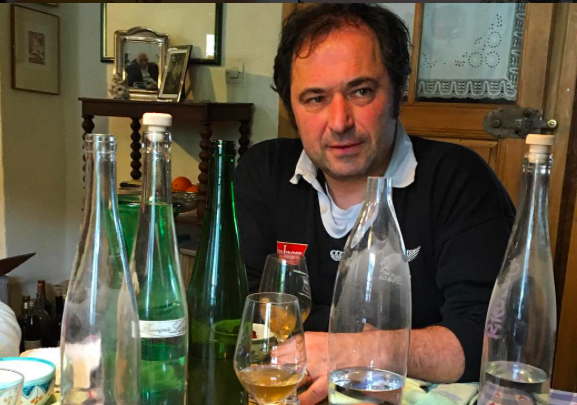There are very few winemaking estates where history and nobility intersect with the avant-garde. But when it happens the results can be revelatory. Since the mid 1990s, Bruno Schueller has been at the helm of the family domaine built by his father, Gerard, in the 1960s. Over the course of two decades, Bruno has developed a style entirely his own. While paying tribute to his father’s patient and meticulous manner of viticulture, he has challenged local orthodoxy in the cellar, molding the definition of Alsatian wine in his own image.
The domaine is located at Husseren-les-Chateaux, the highest village on the slope West of Colmar, on the fringe of the dense forest that consumes the Vosges. Bruno is endowed with holdings in two Grand Cru vineyards, Eichberg and Pfersigberg, and a handful of other small parcels around the village, all of which are sheltered by the mountains to the West, and are notable for their limestone-laced soils. His approach in the vineyards is loosely guided by Biodynamics, but Bruno has never been bothered to seek a certification that could restrict his intuitive process. The most important goal, he says, is slow and gentle ripening, through meticulous management of leaf cover. Bruno routinely harvests several weeks later than his neighbors, while still achieving the same level of sugar before fermentation. He believes that patience before harvest makes a profound difference in the wine’s ultimate expression.
Among the wealthiest and most conservative regions of France, Alsace is hardly known for experimental winemaking, particularly among the region’s Grand Cru vineyards. In this context, Bruno’s wines often appear iconoclastic. But generalizing the dozen or so cuvees he produces each year can be difficult. Most whites, such as his Edeldeluxezwicker field-blend, are throwbacks to 19th century-style winemaking, when it was normal for Alsatian wines to finish malolactic fermentation in foudre and filtration was considered anathema to their aromatic complexity. On the other hand, some of the key twists in Bruno’s approach come from an affection for the natural wines of Italy, the birthplace of his wife, Elena. He experiments with varying amounts of maceration on his Gewürztraminers and Pinot Gris, giving the already aromatic varieties of Alsace a layer of brooding complexity. Finally, Bruno’s rare and mysterious Pinot Noirs, are uplifting expressions of the variety, as heady and delicately perfumed as they are powerful.
At their best, Bruno’s wines are deep, structured, and ornately detailed masterpieces that force us to question mainstream wine’s attachment to typicity, which for Bruno is not a goal, but a point of reference. These are noble wines, from a noble region, that through the kaleidoscopic lens of a truly creative mind, look more exciting than ever before.

